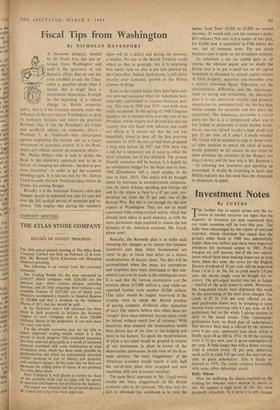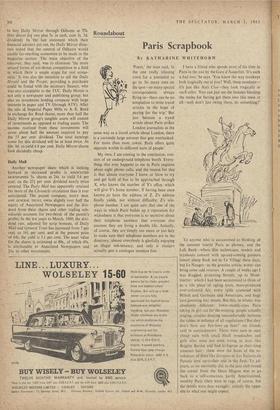Investment Notes
By CUSTOS
THE further rise in equity prices and the in- crease in market turnover are signs that the majority of investors are now convinced that our trade recession will be over 'this year. The bulls were encouraged by the report of ENGLISH ELECTRIC, whose chairman has stated that the group's order book in 1960 was substantially higher than ever before and there were improved prospects for increased output in 1961. Profit margins are still narrow, but if the two subsid- iaries which have been making losses can at least halve them this year, the cover for the English Electric dividend of 10 per cent. will be improved from 1.6 to 2. At 34s. 9d. to yield nearly 5.6 per cent. the shares might even be bought for re- covery. The gilt-edged market was not so happy —fearful of the gold losses to come. Moreover, the long-dated stocks were depressed this week by the advertising of the steel prior charges. The yields of £7 2s. I Id. per cent. offered on the steel preference shares may be tempting to some income trusts receiving only 6.3 per cent. on ICI preference, but on the whole I advise trustees to stick to the dated stocks. (The 'redeemable' preferences have no fixed date of redemption.) The shortest final date is offered by the DORMAN LONG 4 per cent. unsecured loan stock which is finally paid off at 100 in 1974. At 80 the running yield is 5i per cent. and to gross redemption 6i percent. A little longer but with a better running yield is UNITED STEEL 41 per cent. debenture stock at 81 to yield 5.85 per cent. flat and 6.66 per cent. to gross redemption. This is finally re- deemed in 1978. The yields compare favourably with some other debenture stocks.
Daily Mirror
After the buffeting the shares received on the bidding for ODHAMS, DAILY MIRROR 5s. shares at 10s. 9d. against a high level of 15s. 6d., look decidedly attractive. As I write it is still cheaper to buy Daily Mirror through Odhams at 57s. (five shares fof one plus 5s. in cash, cum 3s. 3d. dividend). In the last statement which their financial advisers put out, the Daily Mirror direc- tors stated that the control of Odhams would enable far-reaching economies to be made in the magazine section. The main objective of the takeover, they said, was to eliminate 'the more absurd forms of cut-throat competition in a field in which there is ample scope for real econo- mies.' It was also the intention to sell the Daily Herald and the People, providing a purchaser could be found with the necessary finance, who was also acceptable to the TUC. Daily Mirror is not only a newspaper and publishing group, but also an investment holding company with large interests in paper and TV (through ATV). After the sale of Imperial Paper Mills to A. E. Reed in exchange for Reed shares, more than half the Daily Mirror group's tangible assets will consist of investments as opposed to trading assets. The income received from these investments will cover about half the amount required to pay the 15 per cent. dividend. The total earnings cover for this dividend will be at least twice. At I0s. 9d. to yield 6.8 per cent. Daily Mirror shares look decidedly cheap.
Daily Mail
Another newspaper share which is looking forward to increased profits is ASSOCIATED NEWSPAPERS Ss. shares at 24s. to yield 5.6 per cent. on the 27+ per cent. dividend nearly twice covered. The Daily Mail has apparently retained far more of the Chronicle circulation than it ever anticipated. The parent company, DAILY MAIL AND GENERAL TRUST, owns slightly over half the equity of Associated Newspapers and the divi- dend from these shares and other trading sub- sidiaries accounts for two-thirds of the parent's profits. In the ten, years to March, 1960, the divi- dend rate, adjusted for scrip bonuses, of Daily Mail and General Trust has increased from 7 per cent, to 161 per cent. and at the present price of 64s. the yield is 5.1 per cent. The asset value for the shares is estimated at 80s., of which 49s. is attributable to Associated Newspapers and 31s. to other investments.







































 Previous page
Previous page